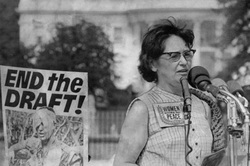 by Yoon Joung Lee Anti-Nuclear leader and founder of the women's peace group, 'Women Strike for Peace,' Dagmar Wilson, was born in New York on January 25, 1916. She spent much of her childhood in Europe where her father was a CBS radio correspondent. In 1937, she graduated from the Slade School of Fine Art in London. In 1939, she eventually moved and settled in Washington as she married Christopher Wilson, a cultural attaché for the British Embassy. There, she worked as a freelance illustrator occasionally, while she raised her three daughters. Her work, "While Susie Sleeps" in 1946, became a best-selling childrens' book. She worked on more than 50 childrens’ books to her credit, including the classic, "Poems to Read to the Very Young," published in 1961. In September 1961, there was an incident that caught her attention. Philosopher Betrand Russell was arrested for participating in an anti-nuclear bomb demonstration at Trafalgar Square in London. That night, she expressed her anger about Russell's jailing, at a cocktail party hosted by Wilson and her husband. The next day, she contacted all the women she knew and they gathered at her living room to plan for women to leave their jobs and kitchen for a day to protest against a planetary crisis, such as radioactive fallout from atmospheric nuclear testing endangering childrens' health. This movement, without political ideology or hierarchy, spread through various groups and clubs including church groups and PTA networks. About 50,000 women across the nation brought together on Nov. 1, 1961, by Women Strike for Peace, marched in 60 cities in the United States and abroad demanding an end to atomic testing. About 1,500 women led by Wilson gathered at the foot of the Washington Monument to protest as well. President John F. Kennedy watched them from a White House window. About two months later, Kennedy revealed at a news conference that he had received the message of these, "extremely earnest," women who were, "concerned as we all are of the possibility of nuclear war." Less than two years later in 1963, President Kennedy signed a partial nuclear test-ban treaty with the Soviet Union and Britain, which bans atomic testing in the atmosphere, in space, and underwater. By the end of the decade, a new generation of activists focused mainly on U.S. involvement in Vietnam. Wilson decided to come back to a quieter life as a landscape painter in Loundoun Country, VA. Wilson died at 94 by natural causes. However, her leadership, her unique initiative, and her vision of women being able to change the world will remain in the hearts of thousands of women forever. |
Archives
July 2017
Categories
All
|
 RSS Feed
RSS Feed